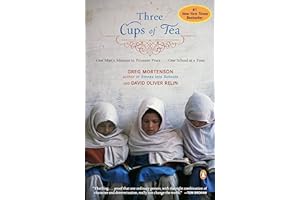One sentence summary:
The book ‘Three Cups of Tea’ by Greg Mortenson is a compelling story of one man’s mission to promote peace through education, told through his experiences of building schools in remote regions of Pakistan and Afghanistan.
Book genre:
Non-fiction, memoir, humanitarian.
Main topic of the book:
The main topic of the book is the power of education and building bridges between cultures to promote peace and alleviate poverty.
Key ideas:
- The transformative power of education.
- The importance of building relationships and trust with the local communities.
- The impact of cultural understanding and respect in promoting peace.
- The challenges and triumphs of building schools in remote and volatile areas.
Main parts of the book and a short summary:
- Part One: Promise – The author, Greg Mortenson, recounts his failed attempt to summit K2 and how it led him to the impoverished village of Korphe, Pakistan, where he is warmly welcomed and makes a promise to build a school for the local children.
- Part Two: Problems – Mortenson struggles to fulfill his promise as he faces various challenges such as lack of funds, cultural barriers, and resistance from local authorities.
- Part Three: Progress – Through perseverance and the help of many supporters, Mortenson successfully builds the first school in Korphe and expands his mission to other villages in Pakistan and Afghanistan.
- Part Four: Peace – Mortenson’s efforts in building schools and promoting education are recognized and he becomes an advocate for peace and understanding between cultures.
Key takeaways:
- Education is a powerful tool in promoting peace and fighting poverty.
- Building relationships and understanding with local communities is crucial in carrying out humanitarian work.
- One person can make a difference, but it takes a community to sustain it.
Author’s background and qualifications:
Greg Mortenson is an American humanitarian, mountaineer, and educator. He co-founded the non-profit organization, Central Asia Institute (CAI), which focuses on promoting education in remote areas of Pakistan and Afghanistan. He has received numerous awards for his humanitarian work, including the Sitara-e-Pakistan (Star of Pakistan) award.
Target audience:
The book is suitable for anyone interested in humanitarian work, education, and promoting peace and understanding between cultures. It is also recommended for those interested in the history and culture of Pakistan and Afghanistan.
Publisher and first publication date:
The book was published by Penguin Books and was first released in 2006.

